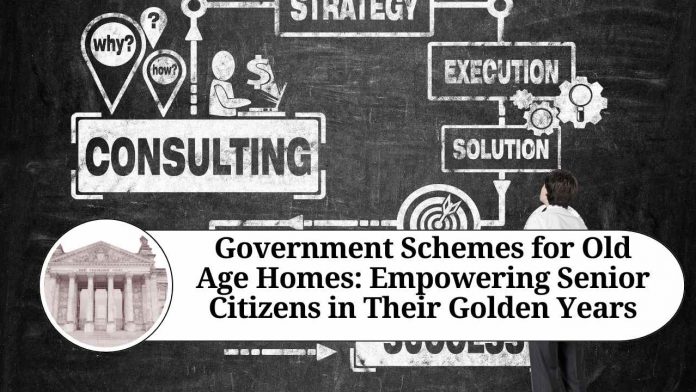Introduction
In today’s rapidly changing world, the significance of caring for our elderly population cannot be overstated. Governments across the globe have recognized the need to provide support and assistance to senior citizens who may not have the means or family support to lead fulfilling lives during their golden years. One such initiative is the establishment of government schemes for old age homes. These schemes aim to ensure that the elderly receive the care, companionship, and security they deserve. In this blog post, we will delve into the benefits and features of government schemes for old age homes, highlighting their impact on the lives of senior citizens.
Enhancing the Lives of Senior Citizens
- Financial Assistance: Government schemes for old age homes often provide financial aid to elderly individuals who cannot afford the cost of residential care. This assistance can cover accommodation, meals, medical expenses, and other essential needs. By alleviating financial burdens, these schemes enable seniors to live comfortably and with dignity.
- Quality Care and Support: Old age homes established under government schemes strive to provide comprehensive care and support systems. Trained staff members attend to the physical, emotional, and medical needs of the residents. From ensuring proper nutrition and hygiene to offering healthcare services and organizing recreational activities, these homes prioritize the overall well-being of senior citizens.
- Safety and Security: For older individuals who may be vulnerable to abuse, neglect, or loneliness, government-funded old age homes offer a safe and secure living environment. These facilities are equipped with necessary safety measures, including 24/7 surveillance, emergency response systems, and trained personnel who can promptly address any concerns or emergencies.
- Social Interaction and Companionship: Loneliness and social isolation can have detrimental effects on the mental and emotional health of senior citizens. Government schemes for old age homes recognize the importance of social interaction and companionship. These homes facilitate opportunities for residents to engage in group activities, connect with peers, participate in recreational programs, and form meaningful friendships, fostering a sense of belonging and happiness.
- Healthcare Access: As individuals age, their healthcare needs often increase. Old age homes supported by government initiatives ensure that seniors have access to healthcare services, including regular medical check-ups, assistance with medication management, and prompt medical attention in case of emergencies. This healthcare support promotes a healthier and more comfortable lifestyle for elderly residents.
- Rehabilitation and Palliative Care: Some government schemes for old age homes also cater to senior citizens who require rehabilitation services or palliative care. These specialized facilities provide support to individuals recovering from surgeries, injuries, or illnesses. Additionally, they offer comfort, dignity, and specialized care to those in the final stages of life, ensuring their well-being and allowing them to spend their remaining time with peace and dignity.
Conclusion
Government schemes for old age homes play a vital role in addressing the needs of senior citizens, particularly those who lack family support or financial resources. By providing financial assistance, quality care, safety, social interaction, and healthcare access, these schemes improve the lives of elderly individuals, promoting their well-being, and offering them a sense of community and belonging. As we strive for a more compassionate and inclusive society, it is essential to continue supporting and expanding such initiatives to ensure that our senior citizens can age gracefully and with dignity.
Read more useful content:
Frequently Asked Questions (FAQs)
Q.What are government schemes for old age homes?
Government schemes for old age homes are initiatives launched by the government to provide support and assistance to senior citizens who may not have adequate means or family support in their later years. These schemes aim to ensure that the elderly receive financial aid, quality care, safety, social interaction, and healthcare access.
Q.How can I apply for a government scheme for an old age home?
To apply for a government scheme for an old age home, you can typically contact the local government authority responsible for elderly welfare or the department dedicated to senior citizens’ affairs. They will guide you through the application process, which may involve submitting necessary documents, proof of age, income details, and medical records.
Q.What financial assistance is available under these schemes?
Government schemes for old age homes often provide financial assistance to cover various expenses such as accommodation, meals, medical care, and other essential needs. The level of financial aid and specific benefits may vary depending on the scheme and the region or country in which you reside.
Q.Are government-supported old age homes free of charge?
While some government-supported old age homes may offer free services or heavily subsidized rates, it ultimately depends on the specific scheme and the financial circumstances of the individual. In certain cases, residents may be required to contribute a portion of their income towards the cost of their stay in the old age home.
Q.What kind of care can I expect in a government-sponsored old age home?
Government-sponsored old age homes typically provide comprehensive care and support to their residents. This includes assistance with daily activities, access to healthcare services, nutritious meals, recreational activities, and emotional support. Trained staff members ensure the well-being and safety of the residents.
Q.Can I choose the location of the old age home under the government scheme?
The availability and location of old age homes under government schemes may vary based on the region or country. While some schemes may provide options for individuals to choose the location, others may assign residents based on availability and need. It is advisable to inquire about location preferences during the application process.
Q.Can family members visit residents in government-supported old age homes?
Yes, family members are generally allowed to visit residents in government-supported old age homes. However, specific guidelines and visiting hours may be in place to ensure the safety and well-being of all residents. It’s best to check with the old age home administration for any visitation policies or restrictions.
Q.Can I bring personal belongings with me to a government-supported old age home?
In most cases, residents of government-supported old age homes are allowed to bring personal belongings such as clothes, furniture, and sentimental items. However, it’s advisable to check with the facility regarding any restrictions or guidelines on the types and quantities of personal belongings that can be accommodated.
Q.Are there any age restrictions to qualify for government schemes for old age homes?
The age restrictions to qualify for government schemes for old age homes can vary depending on the specific scheme and the country or region in which it operates. Generally, individuals must be above a certain age (often 60 or 65 years) to be eligible for such schemes.
Q.Are government schemes for old age homes available in every country?
Government schemes for old age homes are not universally available in every country. However, many countries have implemented programs and initiatives to support senior citizens. It’s advisable to research the specific policies and schemes in your country or region to determine the availability and eligibility criteria for government-supported old age homes.





















I found this blog post to be very helpful. I’m glad you took the time to share it with us.